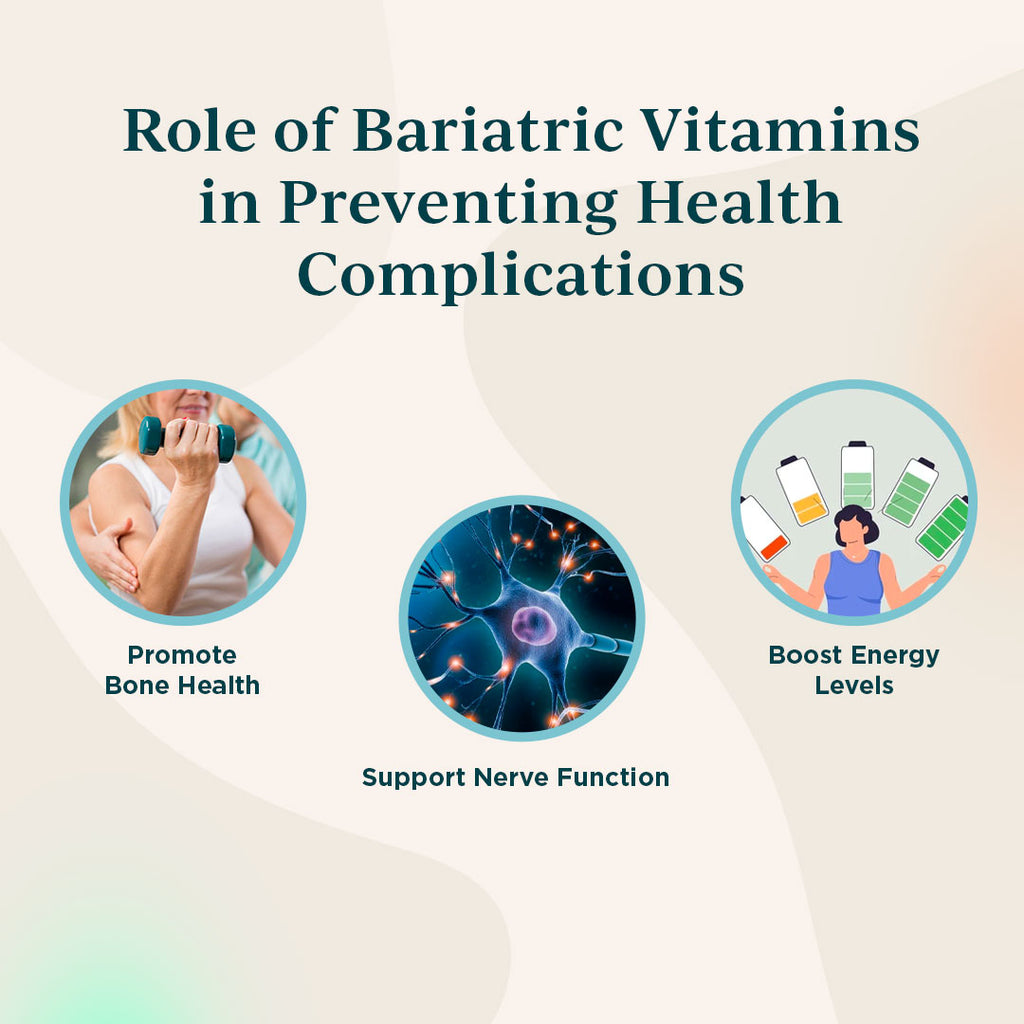
Bariatric Vitamins for Long-Term Health: What Research Tells Us
Bariatric surgery offers a sustainable solution for weight management, with significant weight loss often maintained for years, leading to lasting improvements in health and well-being. However, despite this benefit, there's one notable challenge awaiting bariatric patients post-surgery: preventing vitamin deficiencies.
That's where bariatric vitamins come in. Whether you're a recent weight loss surgery patient or contemplating undergoing weight loss surgery, understanding how to support your long-term health with the right bariatric vitamins is essential.
In this guide, we'll explore the importance of bariatric vitamins post-surgery, uncover common deficiencies, and highlight what research says about bariatric vitamins. Let's dive in.
Importance of Bariatric Vitamins Post-Surgery
Bariatric surgery alters the digestive tract, affecting the way the body absorbs key vitamins and minerals, including iron, calcium, vitamin B12, and vitamin D. These deficiencies can lead to various health problems, including:
- Bone complications due to a deficiency of vitamin D and calcium
- Anemia due to changes in the way the body absorbs iron and vitamin B12
- Neurological issues due to a lack of vitamin B12
By taking a targeted bariatric vitamin regimen, you can prevent these deficiencies and enhance your health.
However, the benefits of bariatric vitamins go beyond preventing deficiencies. They can also boost your energy levels, support muscle function, and enhance immunity, making them integral to your well-being post-surgery.
Nutritional Challenges After Bariatric Surgery

While bariatric surgery offers remarkable benefits, it can come with various nutritional challenges post-surgery, including:
Reduced food intake: Weight loss surgery reduces stomach capacity, impacting food intake. This can lead to micronutrient deficiencies.Altered nutrient absorption: Weight loss surgery alters the digestive tract, resulting in malabsorption of essential nutrients like iron, vitamin D, calcium, and vitamin B12.Dietary changes: New dietary guidelines post-surgery often involve restrictions on certain foods and increased focus on protein. These changes can make it difficult to meet your vitamin and mineral needs through diet alone.Dumping syndrome: This is a condition in which some post-surgery patients experience issues like nausea, diarrhea, and fatigue, further limiting food intake and nutrient absorption.
Research Studies on Bariatric Vitamin Efficiency
Bariatric vitamins are essential post-surgery, but can they address your unique nutritional needs effectively? Here are some recent scientific studies backing their efficacy:
Deficiency Reduction
A 2018 study found that Roux-en-Y gastric bypass (RYGB) surgery resulted in multiple nutritional deficiencies, including deficiencies for iron, vitamin B12, and vitamin D. Patients who took bariatric multivitamins had a lower rate of these deficiencies compared to patients who didn't take supplements. This highlights the importance of targeted supplementation post-surgery.
Improved Health Outcomes
A 2021 study found that premenopausal women who took supplements rich in vitamin D and calcium after gastric bypass and sleeve gastrectomy surgery experienced decelerated bone loss, a crucial factor for preventing osteoporosis. This demonstrates the long-term benefits of bariatric vitamin supplementation on specific health concerns.
Enhanced Well-Being
Patients who undergo bariatric surgery experience fatigue post-surgery due to reduced nutrient absorption. A 2014 study found that nearly 20% of people reported a reduction in fatigue and enhanced psychological and cognitive function after taking supplements.
Long-Term Health Implications of Bariatric Vitamin Deficiencies

While the immediate effects of vitamin deficiencies may seem subtle, ignoring them can have adverse and lasting consequences on your long-term health post-bariatric surgery. That said, here are some common long-term effects of bariatric vitamin deficiencies:
Compromised Immunity
Iron, vitamin C, and vitamin D are all pivotal to robust immunity. Deficiencies in these nutrients can make you more prone to infections, delaying wound healing and increasing the risk of illness.
Neurological Issues
B vitamins play a critical role in supporting neurological health. Deficiencies in B vitamins can result in neurological issues like headaches, memory loss, and difficulty concentrating.
In extreme cases, vitamin B deficiency can lead to Wernicke's encephalopathy (WE). WE is a serious neurological condition caused by a lack of thiamine (vitamin B1). Common signs of WE include confusion, coordination loss, difficulty walking, drowsiness, and heart complications like low blood pressure.
Cardiovascular Issues
Iron, vitamin B12, and folic acid deficiency can affect red blood cell production, potentially leading to anemia. Anemia impairs oxygen delivery throughout the body, strains the heart and increases the risk of cardiovascular complications.
Mental Health Concerns
Research has linked deficiencies in nutrients like B vitamins, vitamin D, magnesium, iron, and calcium to mental health issues like depression and anxiety. Ensuring you meet your recommended daily intake for these nutrients can enhance your emotional well-being and prevent mental health issues.
Role of Bariatric Vitamins in Preventing Health Complications

Bariatric vitamins prevent various health complications after surgery. While it's still essential to take a balanced diet, complementing a nutritious diet with bariatric vitamins can reduce the risk of various long-term issues post-bariatric surgery. Here are some of the critical roles of bariatric vitamins post-surgery:
Promote Bone Health
Bariatric surgery can disrupt calcium, magnesium, and vitamin D absorption, jeopardizing bone health. Bariatric vitamins specially formulated with adequate amounts of these nutrients can promote bone health and prevent bone diseases like osteoporosis.

Our Calcium & Magnesium formula comes in a delicious juicy orange and vanilla flavor and is rich in calcium, magnesium, and vitamin D3 — the key nutrients required for optimal bone health.
Support Nerve Function
Bariatric surgery can impede the natural absorption of vitamin B12, potentially leading to deficiencies. Vitamin B12 plays a critical role in nerve function. Bariatric vitamins that are rich in vitamin B12 can protect your nervous system and promote cognitive function.

Our Pure Methyl B12 formula contains the recommended daily amount of vitamin B12, making it ideal for post-bariatric surgery patients.
Boost Energy Levels-
Common signs of iron deficiency include fatigue, dizziness, and shortness of breath. Bariatric vitamins rich in iron can ensure your body has the oxygen-carrying capacity it needs for optimal energy levels.

Our Vegan Liquid Iron formula is specially designed to boost energy levels, enhance immunity, and improve cognitive function.
Promote Health Health
Deficiencies in iron, folic acid, and vitamin B12 can lead to anemia, affecting red blood cell production and straining the heart. Bariatric vitamins rich in these nutrients can address these deficiencies and safeguard your cardiovascular health.
Recommended Bariatric Vitamin Guidelines
When it comes to bariatric vitamins, there's no one-size-fits-all approach, as nutritional needs vary from person to person based on factors like medical history, dietary preferences, and surgery type. Nonetheless, here are some crucial guidelines to bear in mind:
Consider Multivitamins
While individual needs vary from one post-surgery patient to another, most bariatric healthcare experts recommend taking a daily bariatric multivitamin including the following nutrients:
- Calcium
- B vitamins
- Vitamin C
- Vitamin A
- Iron
- Folic acid
- Zinc
- Vitamin K
- Vitamin E

Our Complete Multiple formula contains a rich blend of various nutrients, making it a convenient way to address vitamin deficiencies.
Seek Professional Guidance
Consult your healthcare team. Personalized advice is invaluable, as individual needs may vary based on surgery type, medical history, and lifestyle factors. Your healthcare team can recommend a personalized vitamin regimen tailored to your specific surgery type and potential deficiencies.
Prioritize Quality
Opt for bariatric-specific vitamins rather than over-the-counter multivitamins because they are specially formulated for post-surgical needs. Generally, they provide the right combination of nutrients in easily absorbable forms, maximizing their effectiveness.
Consider Form
Consider liquid supplements rather than pills if you have malabsorption concerns or experience nausea after surgery. Discuss absorption concerns with your healthcare team for the optimal form based on your needs.
Consider Timing
Adhere to a consistent schedule for vitamin intake. Discuss optimal timing with your healthcare team, considering medication schedules and individual needs.
Additionally, bear in mind bariatric vitamins are just one piece of the puzzle. If you want to maintain long-term results post-surgery, it's essential to maintain a healthy diet. Some good sources of vitamins after bariatric surgery include fish, dairy products, cruciferous vegetables, and citrus fruits.
Conclusion
Bariatric vitamins play a pivotal role in your well-being and long-term health post-surgery. Prioritize quality, consult healthcare professionals, and adhere to a strict schedule.
Check out our collection of bariatric liquid vitamins for a wide range of supplements tailored to various individual needs.
FAQs
Are All Multivitamins the Same?
No. Regular over-the-counter multivitamins don't provide the appropriate dosage or form of nutrients after bariatric surgery. Look for specifically formulated bariatric vitamins designed for your needs and absorption concerns.
Do I Need to Take Bariatric Vitamins Forever?
Many patients require lifelong supplementation after bariatric surgery due to altered absorption of nutrients. However, your individual needs may change over time. Consult your physician or dietician for regular evaluations and adjustments to your vitamin regimen.
Can I Get Enough Vitamins From My Diet Alone After Bariatric Surgery?
While a healthy diet is essential, post-surgery changes to the digestive tract can hinder nutrient absorption from food alone. Bariatric vitamins ensure you receive the recommended daily intake of essential nutrients regardless of dietary limitations.
Do Bariatric Vitamins Have Side Effects?
Some individuals may experience gastrointestinal issues like constipation, nausea, or diarrhea, particularly when they start taking bariatric vitamins. If you experience any of these issues, notify your healthcare provider.
Do Bariatric Vitamins Interact With Other Medications?
Certain bariatric vitamins may interact with other medications, reducing their efficacy. Inform your doctor and dietician about all medications and supplements you take. They can check for potential interactions and ensure optimal absorption of all medications.


Leave a comment